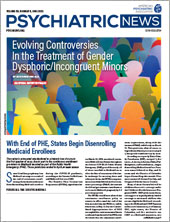In March, the U.S. Department of Health and Human Services (HHS)
settled a federal civil rights complaint against an obstetrics and gynecology practice that involved the practice’s refusing to respond to a patient’s repeated requests to provide a sign language interpreter for an appointment.
By failing to provide the means for effective communication for patients who are deaf or hard of hearing, the practice violated Section 504 of the Rehabilitation Act of 1973 and Section 1557 of the Affordable Care Act of 2010.
As a result of the agreement, the practice agreed, among other things, to develop effective policies and practices to ensure the availability of auxiliary aids and services for disabled patients, to ensure nondiscrimination and nonretaliation, and to train staff on these new policies and practices.
This case is a reminder for all psychiatrists of their obligation to ensure that patients can effectively communicate with them. In addition to the obligation to provide auxiliary aids and services to accommodate identified disabilities, psychiatrists’ obligation also extends to ensuring effective communication with patients of limited English proficiency.
As stated by the APA Ethics Committee: “Psychiatrists have an obligation to communicate effectively with patients about their medical condition, treatment options, recommendations, and other pertinent information such that patients may make informed decisions about their medical care. As such, psychiatrists must use reasonable efforts to secure assistance in effective communication that would allow patients to make informed consent decisions” (Opinion N.16, Opinions of the Ethics Committee on The Principles of Medical Ethics).
To meet this obligation, psychiatrists should develop office policies and procedures to ensure that effective communication is possible with patients and to ensure there will be no discrimination or retaliation against patients who require assistance. Such policies and procedures may include the availability of an interpreter (American Sign Language or foreign language) or other reasonable means of ensuring communication such as written translation and the availability of auxiliary aids for hearing-impaired patients.
Nondiscrimination policies should require physicians and clinical staff to collaborate with their patients in making reasonable accommodation decisions, emphasizing patient preferences whenever possible. Further, practices should ensure that staff receive effective training about their policies. ■

